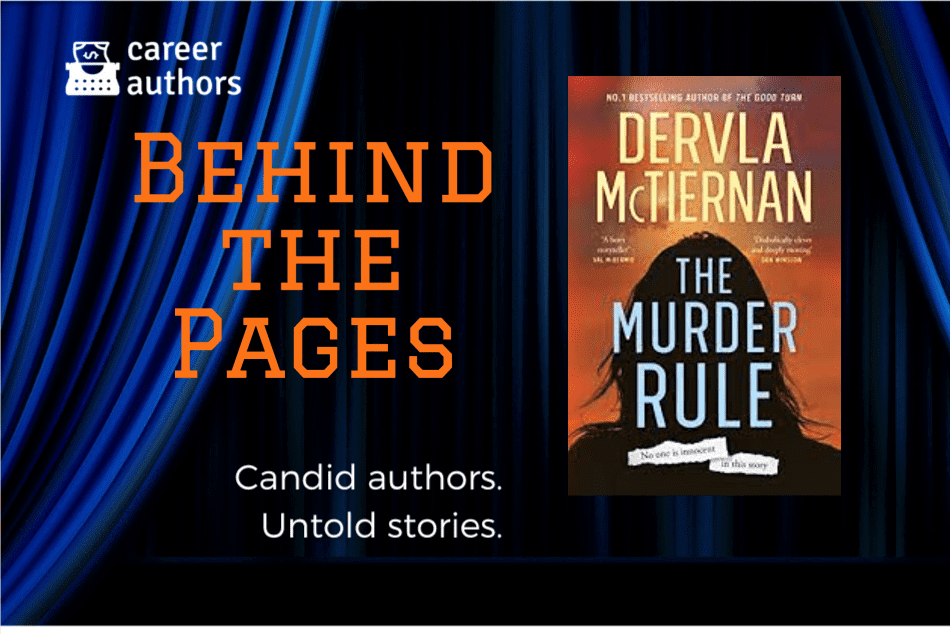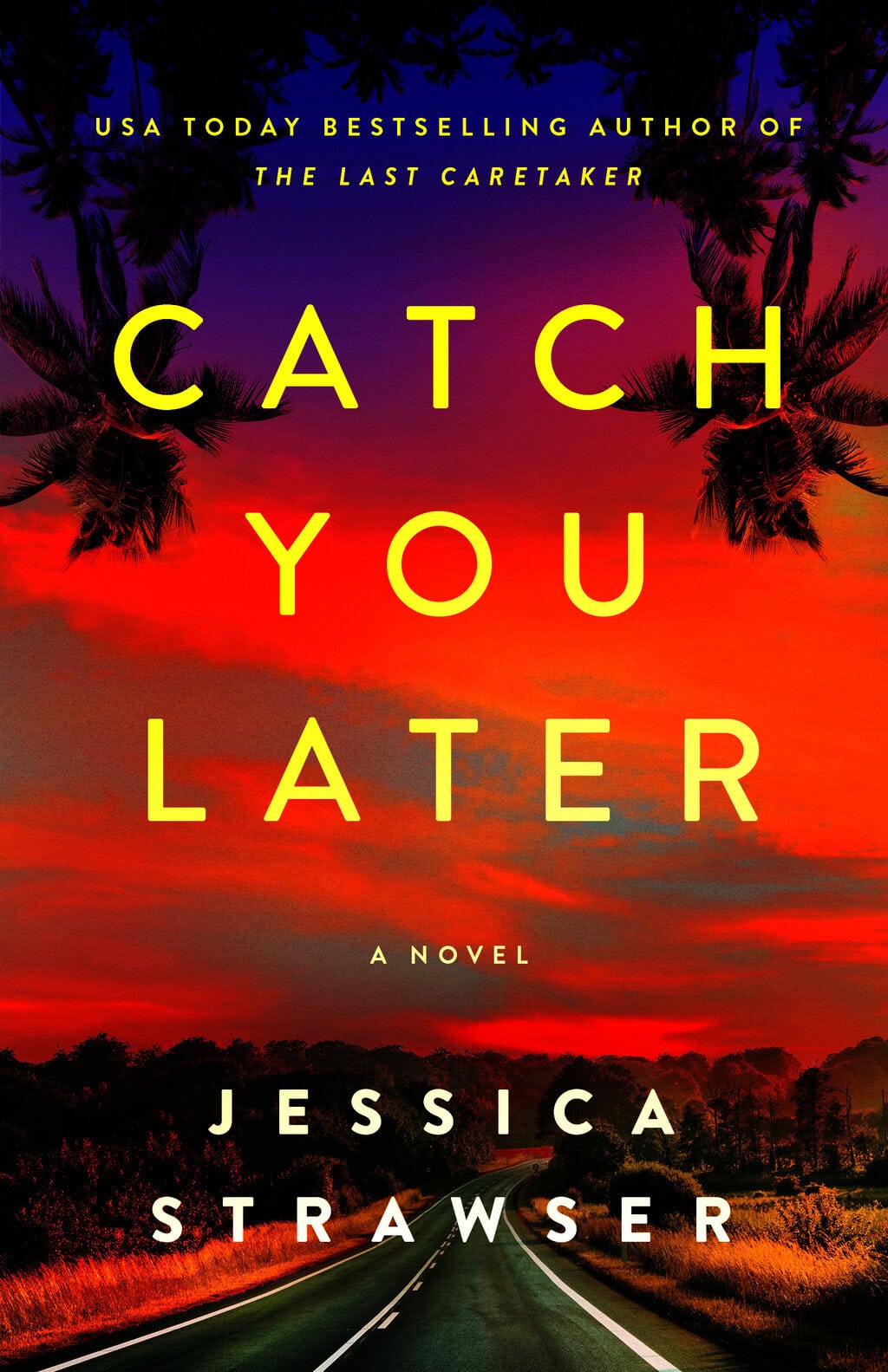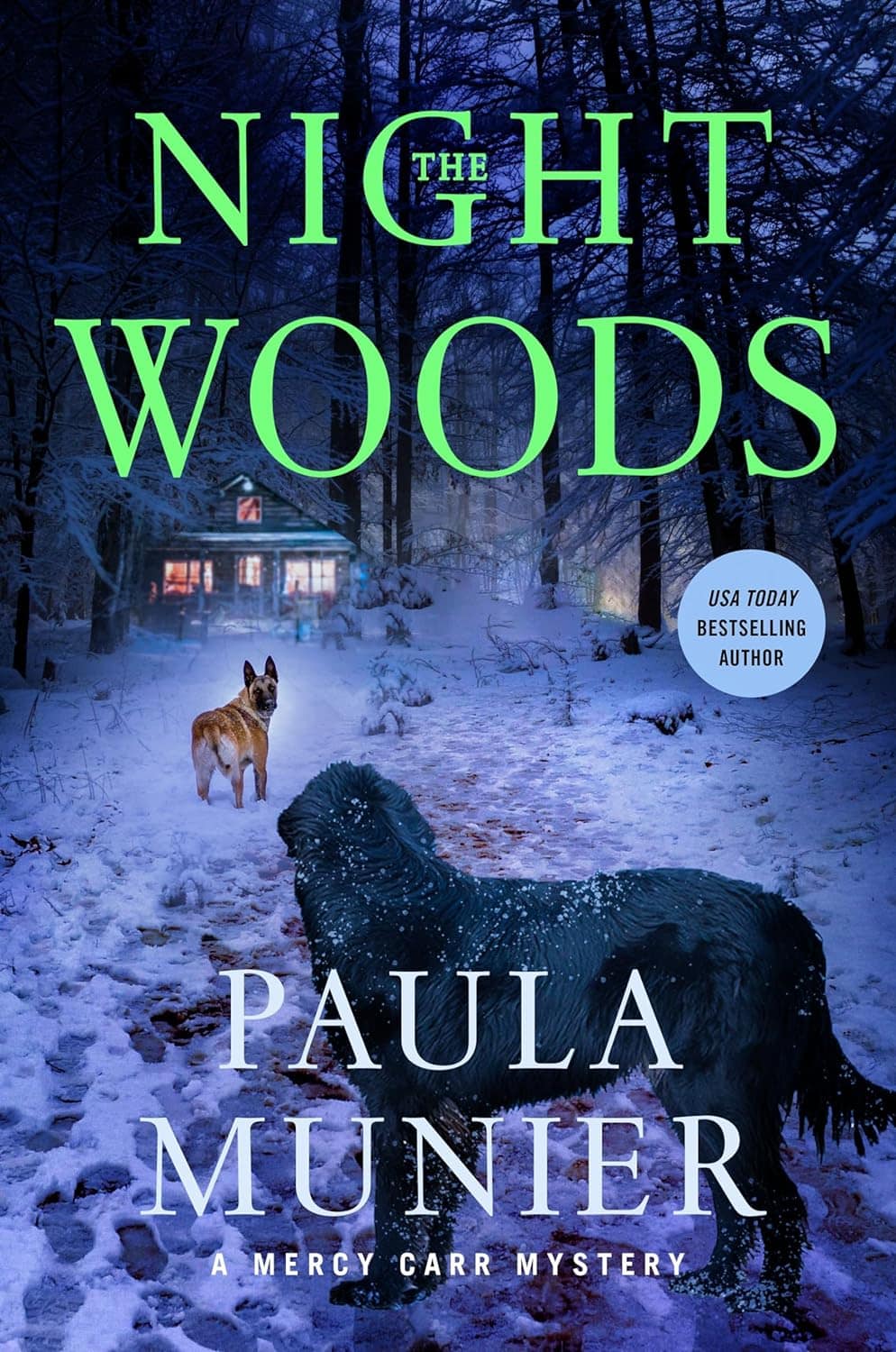CareerAuthors is about writing, but it’s also about life as a writer. One momentous day in Dervla McTiernan’s life, traumatic and dramatic events crashed together: six minutes after receiving news about a potentially fatal tumor brain tumor, she got her big break: a literary agent was interested in her debut novel.
Dervla’s story has a more than happy ending. And after a successful surgery, her debut novel was an international bestseller, with close to a million books sold in Australia alone. It turns out no one could be more skilled at creating moving, fast-paced fiction from the intense events of real life, as you will see in the following interview in which Devla discusses what brought her to write The Murder Rule, a novel Karin Slaughter called “gripping and full of tension, with twist after unexpected twist.” What’s behind the pages?
We asked, Dervla answered.
- What’s the title of your book—and was that always the title?
The title of the book is The Murder Rule, and it was definitely not always the title! I’m pretty picky about titles for books and my agent is even pickier, so finding the right title for the book was a long journey. When I finally hit on The Murder Rule, I felt fairly sure it was the right title for the book, though I still had to pitch it to my agent and my editors. I was extremely relieved when everyone liked it!
“The Murder Rule” refers to the felony murder rule, which in essence says that if a person commits a felony and a death occurs during the felony, the person committing the felony can be found guilty of murder, even if they had nothing to do with the actual death. It’s an odd bit of law that has resulted in some very unjust convictions. For example, there was one case where a person committed an armed robbery, was caught, arrested, and placed in the back of a police car. While he was sitting hand-cuffed in the police car, a police officer shot his accomplice dead. The hand-cuffed man was convicted of felony murder.
The law operates differently depending on the state you’re in, with some states having better safeguards than others, but as a basic premise the law struck me as very odd. I was always taught that to be legally responsible for an act you must have carried it out yourself, and have intended to carry it out. Neither of those pre-requisites apply in the case of felony murder. The title works for the book, for a lot of reasons, but in particular because one of the ideas I was interested in examining was where the line is drawn with culpability. My main character, Hannah Rokeby, takes some pretty extreme actions because she is convinced of the righteousness of her position. Is Hannah responsible for the results of her actions, even if she didn’t foresee them?
- Who’s the main character of your book—and was that always their name?
My main character is called Hannah Rokeby, and that was always her name. For most of the writing of the book, the working title was Hannah Rokeby. I don’t know what it is about the name in particular, but it just felt right. For me it had a rhythm and weight to it that felt right for the character.
- At the start of the book, what’s the character’s goal?
Hannah is a young law student. At the beginning of the book she joins the Innocence Project just as they are taking a case to trial – they’re trying to save an innocent man from death row. On the face of things, Hannah appears to be bright, eager to please and idealistic to the point of naiveté. On the surface she’s trying hard to win the acceptance of the Innocence Project team and to help free an innocent man. But the real Hannah is very different. The real Hannah is darker, more complicated, and she’s working for her own agenda. She’s quite ruthless in her pursuit of her aims, probably because she’s so convinced that she’s on the right side. Whether or not she’s right about that remains to be seen!
- What was the core idea for this novel—a plot point? a theme?—and where did it come from?
A few years ago I came across an article in a newspaper about a young Irish law student who had spent a summer volunteering in the US. The law student had spent her summer working for the Innocence Project, trying to free an innocent man from prison. When her time in America was over, the student kept working the case from Ireland. She managed to convince a retired police officer to tell her the truth about evidence that had been hidden in the original prosecution. As a result of her hard work, the innocent man, who had spent more than twenty years in prison, was freed.
The article fascinated me and I did some more research, reading everything I could find about the case. My enthusiasm was a little dimmed by what I discovered. It turned out that even after the hidden evidence was found, it took a further five years before the exoneration application was heard, and by the time he was freed the innocent man had only 3 years left on his maximum sentence.
To me this was quite different to the inspirational story of triumph over adversity that I’d first read. It was sadder and more complicated, and I wondered why these details had been left out of the articles I’d read. Maybe it was because the journalists (or their editors) preferred the cleaner, more inspirational take. Or maybe (darker thought) the Innocence Project had pushed the prettier story as part of a publicity drive for their work. Or maybe I was just over-complicating things, reading into the situation facts not in evidence at all. Still, the discovery made me think about moral grey areas. About what it must be like to be a good person working for the Innocence Project. Doing such impossibly challenging work in a world that is so loud, and messy and unwilling to listen or help. What small ethical compromises would I make along the way, and where could those choices lead me? I felt that there was a story in that idea. A story that could fold in on itself, with twists and turns and pace and, hopefully, heart.
- At what point did you come up with the final version of the last line?
Once I knew where I was going with the ending the final scene came out pretty much in one piece. I usually write the last scene very late in the day, usually after I’ve completed a couple of drafts of the book, when I have a pretty clear end point in mind. It’s important to me that there is a real journey in the book, that the character goes into the story believing certain things, and that the story forces them to reexamine those beliefs and maybe change. In this case the last line was really intended to underline the journey that Hannah has been on, and how she has changed as a result of the events of the book. So in a way, the last line wrote itself.
- Did you know the ending of the book when you started?
Not exactly. There were a few different ways I could go with it and for a long time I was conflicted about what to do with a very important secondary character, whether to make them really bad or put them in a place where they were capable of redemption. I won’t say too much here because of spoilers, but my indecision about this made the writing of the book a lot tougher. Once I finally made that decision I had a pretty good idea about what I was going to do with the ending.
- What’s something in this book that you’ve never done before?
The book has two interlinked storylines, one from twenty years in the past, told through a series of diary entries. That was very new to me and I was nervous about it. I was afraid that readers would love one voice but hate the other, and then you’d end up with a book where the reader is skimming through pages to get back to the voice they like, and that’s just the worst. So I had to work really hard to get the voice in the diary right and to try to make those passages truly entertaining in their own right.
- What part of your tour (or launch week) are you most excited about?
I’m doing my first US tour, and I’m super excited about that. I’m doing events in LA (with Rachel Howzell hall), Phoenix (with TJ Newman), Atlanta (with Karin Slaughter) and New York (with Don Winslow). I mean, come on! Who gets a first tour like that? I’m feeling incredibly lucky and super excited to get started.
- Who in your #writingcommunity deserves a special shout-out for supporting you in writing this story?
This isn’t so much about the writing of this story (big thanks for that go out to my agent, Shane Salerno, and my editors Emily Krump, Anna Valdinger and Phoebe Morgan for that) but when you say writing community I think of my buddy, Sara Foster, a true friend and a wonderful writer. Sara is one of the world’s truly good people. We call each other in success or failure, for congratulations or commiserations, and we always have each other’s backs.
- How do you want readers to feel when they close the book?
I think when a book has really delivered something special to me, the first thing I want to do is talk to a friend about it. I don’t have to love every element of a book to feel excited about it. I might love parts of it but not others. I might agree or disagree with themes or elements of the book, but what I love is that woken up feeling. Where a book has made me feel and think things I haven’t felt or thought before and I just need to call someone and talk about it and see if they felt the same way. I’d absolutely love it if my book made people feel like that.
- What did you learn from this book?
Gosh, so much. This was a tough book for me to write, technically speaking. My previous books were written in third person, for starters. I’d written novellas in first person before but not a full length novel. And I was working with two interwoven stories, which is always really tricky. So I think I learned some new technical skills. But I also learned so much about how people are unjustly convicted. The junk science, the shoddy witness statements and the forced confessions. I thought I knew a lot about it going in, but I really didn’t have a clue about the extent to which it has gone on.
Join us on Facebook and let’s talk about inspiration, core ideas, and what makes for the best legal thrillers.
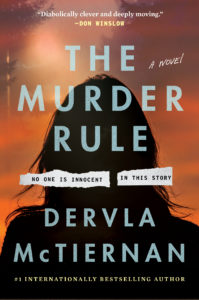
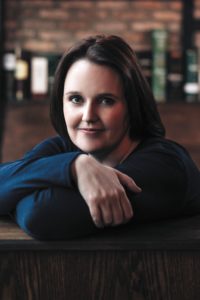 International #1 bestselling author Dervla McTiernan spent twelve years working as a lawyer, but following the global financial crisis, she moved from Ireland to Australia and turned her hand to writing. Her first two novels, The Rúin and The Scholar, received critical acclaim around the world, and The Ruin has been optioned for TV by Hopscotch Features. She’s won multiple literary prizes, including an International Thriller Writers Award. Dervla is a member of the Sisters in Crime and Crime Writers Association, and lives in Perth, Australia, with her husband and two children.
International #1 bestselling author Dervla McTiernan spent twelve years working as a lawyer, but following the global financial crisis, she moved from Ireland to Australia and turned her hand to writing. Her first two novels, The Rúin and The Scholar, received critical acclaim around the world, and The Ruin has been optioned for TV by Hopscotch Features. She’s won multiple literary prizes, including an International Thriller Writers Award. Dervla is a member of the Sisters in Crime and Crime Writers Association, and lives in Perth, Australia, with her husband and two children.

